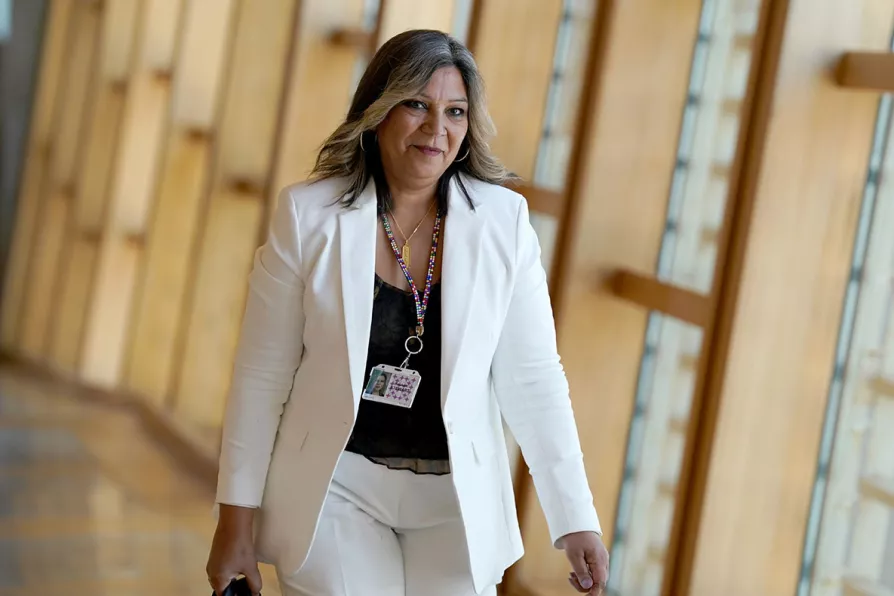RICHARD BURGON MP speaks to Ben Chacko about the Labour right’s complicity in the Mandelson scandal and the need for a total break with Starmerism if the party is to defeat Reform

 Kaukab Stewart MSP arrives for an SNP group meeting at the Scottish Parliament in Holyrood, Edinburgh, June 13, 2023
Kaukab Stewart MSP arrives for an SNP group meeting at the Scottish Parliament in Holyrood, Edinburgh, June 13, 2023
EDINBURGH Rape Crisis Centre (ERCC) failed “to protect women-only spaces,” “did not put survivors first” and “caused damage” to many women seeking its support, an independent review has found. It is a shameful verdict on a service founded in 1978 as a grassroots feminist organisation run for women by women.
The review was commissioned after a damning employment tribunal judgement in May which found that Roz Adams, a support worker, was unlawfully forced out of her job by ERCC on the grounds of her gender-critical beliefs.
The review, commissioned by Rape Crisis Scotland on the back of an excoriating judgement, has now found that ERCC breached core standards by requiring women and girls to specify that they want a service delivered by a biological woman but offering this only if specifically requested. Putting women in this position “does not amount to the provision of protected women-only spaces,” says the review.
Damningly, it concludes that ERCC failed to prioritise the needs of rape survivors, 94 per cent of whom are female and for whom “trauma-informed” means single-sex therapeutic support.
The review found no mention of dedicated women-only services in ERCC’s current strategy or on its website. Despite its primary or major purpose being to support women and girls (according to national standards), ERCC was found not to have a working definition of “woman,” preferring the term survivors of all “genders.”
How could this possibly have happened? According to the employment tribunal, ERCC had become gripped by “extreme gender identity belief.” This was its priority, and the outcome, evidenced by the review, is that biological sex no longer matters, even in a rape crisis centre.
At the centre of this, according to the employment tribunal judgement, was its CEO, Mridul Wadhwa. Wadhwa, who identifies as a transwoman, was appointed in July 2021 to a post advertised as reserved for biological women under Schedule 9 of the Equality Act 2010.
The tribunal concluded that having formed the view that Adams was transphobic, Wadhwa was the “invisible hand” behind a “heresy hunt” conducted against her involving a “completely spurious and mishandled disciplinary process.”
Who will be held accountable for women and girls in Edinburgh and Lothian being denied a single-sex service for “at least 16 months?” In ERCC’s case, both the employment tribunal judgement and independent review highlight Wadhwa’s role.
Wadhwa has now been allowed to resign without facing consequences. However, as CEO, Wadhwa was enabled not only by a weak trustee board, but by supporters much higher up the political food chain.
Under Nicola Sturgeon, the SNP government was determined to push through the concepts of “gender identity” and “self-ID” both in legislation and policy. These are now embedded in the framework of government policy and funding conditions that form the operating context for services.
Playing an important role in this are third-sector organisations funded by the government to shape public and voluntary sector policies and service delivery. The Stronger Together guidance for women’s sector services produced by LGBT Scotland and Scottish Trans Alliance is one example, littered with misinformation about the 2010 Equality Act.
How deeply gender identity and “self-ID” are now embedded was underlined in other news this week, when Police Scotland, under mounting pressure, announced a U-turn in its recording policies.
In future, the perpetrators of rape or attempted rape offences will be recorded as male, rather than by their chosen gender identity, which is the current established practice.
However, it remains unclear whether this extends to all sexual offences, meaning women may still be officially recorded as responsible for male crimes of sexual and other violence.
The national umbrella body Rape Crisis Scotland (RCS), along with other “mainstream” women’s organisations, has been a key enabler of gender identity and “self-ID” policies.
Its CEO, Sandy Brindley, who commissioned the review, has confessed to incompetence, claiming she “had no idea” what was happening at ERCC despite being a public ally and friend of Wadhwa and despite survivors meeting with her in 2019 to raise these very issues.
In fact, it’s a matter of public record that RCS and Brindley personally have been keen advocates of gender identity ideology and strategically valuable ones at that.
When the Forensic Medical Services (Victims of Sexual Offences) Act was going through Parliament in 2020, RCS publicly opposed an amendment giving victims the right to choose the sex of their examiner, a move that flew in the face of the evidence given to Parliament by survivors when the Bill was first being considered.
RCS made a conscious decision to prioritise gender identity belief over the expressed needs of female survivors. And again, in 2022, RCS supported the introduction of self-ID of sex into law via the Gender Recognition Reform (Scotland) Bill.
RCS played a key role in undermining women’s concerns by arguing that rape crisis services had successfully operated self-ID for years and had experienced no conflict with women’s rights. Less than two years later, that claim has not worn well. No wonder there are calls for Brindley to resign.
Looking at these facts, who can have confidence that RCS is capable of reforming ERCC to meet the needs of biological women and girls? No-one except predictably the minister for Equalities, Kaukab Stewart, who was one of four SNP MSPs photographed beside a “Decapitate Terfs” placard last year.

WILL PODMORE welcomes the case put by a feminist, disentangling the abusive rhetoric of the trans rights debate

Susan Galloway talks to ASH REGAN MSP about her “Unbuyable” Bill, seeking to tackle the commercial sexual exploitation of women in Scotland












